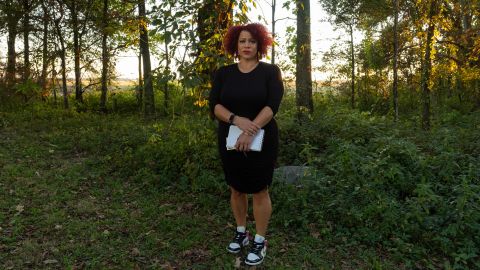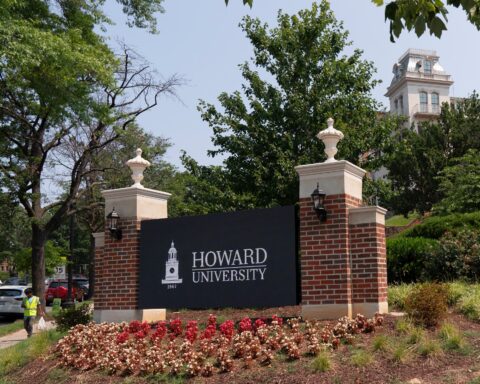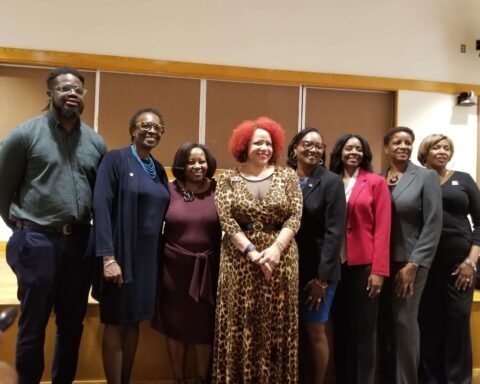By Candice Williams
A little more than three years after “The 1619 Project” published in The New York Times Magazine, presenting a provocative examination of the American slave trade and its legacy, Nikole Hannah-Jones will debut her Pulitzer Prize-winning work on Hulu Thursday with a specific purpose in mind: to strengthen the case for reparations.
“We’re going to have to fight for equality, whether we get reparations or not,” she said. “But I would rather we’re fighting for equality having gotten some semblance of financial justice for the financial and other crimes that Black people have experienced.”
The Hulu series, produced under the Onyx Collective brand, carefully builds a case for reparations by providing a historic and contemporary analysis of the impact of slavery. Hannah-Jones’ argument for reparations, though, is not new.
The fight for reparations has been going on for centuries in federal and state governments. During every congressional session from 1989 until he retired in 2017, Rep. John Conyers, D-Mich., introduced a bill to create a commission to report on the impact of slavery and offer recommendations for reparations known as H.R. 40.
The bill finally passed a committee vote in the House in 2021, with Rep. Sheila Jackson Lee, D-Texas, as its lead sponsor. Even with that milestone, Duke University professor and economist William Darity said it’s unlikely that a reparations bill will pass with a Republican majority in the House. Still, he remains a staunch advocate for reparations and the elimination of the racial wealth gap.
“I don’t think there’s anything else that can be done besides a federal program, direct payments to Black American descendants of U.S. slavery,” Darity said. “If the focus is on the racial wealth gap as the strongest economic indicator of the cumulative intergenerational effects of white supremacy in the United States, then no, there’s nothing that can be done by other entities, or there’s no other policies besides a direct payment strategy that would truly, truly accomplish that goal.”
In the Hulu series and in many of his published works, including a 2021 article in The Economist co-written with A. Kirsten Mullen, Darity estimated that it would cost the federal government between $12 trillion to $14 trillion to pay financial restitution to Black American descendants of those enslaved. He notes that Black people were excluded from full citizenship in the U.S. at the nation’s founding and it would take an average of $350,000 per person to help close the wealth gap for the 40 million descendants alive today.
“The community is owed a debt from the federal government that has never been met over the course of the 157 years since the end of the Civil War,” he said, citing several “negative policies” like the denial of 40-acre land grants for Black Americans by the government, which returned 400,000 acres of land back to Confederate owners. Darity also referenced massacres of Black people across the country by white terrorists, and the appropriation and seizure of Black-owned property in the aftermath of the Civil War. Those practices, he said, carry over to discriminatory housing practices against Black Americans, a widening racial wealth gap and a pattern of policies that have stunted the financial growth of Black Americans.
While there have been efforts to issue redress to Black Americans at state and local levels — so far, in areas including California, Kansas City, Missouri, and Evanston, Illinois — there remains debate as to whether these attempts can provide an adequate substitute for federal reparations.
“I have real reservations about relying upon state governments or municipal governments to do this,” Darity said. “They don’t have the capacity to eliminate the racial wealth gap. And whatever they choose to do is bound to fall far short of what is merited by the eligible population.”
Hannah-Jones, however, said Black Americans should not reject any potential funding, even if it’s on the state level and potentially inadequate to provide financial redress.
“Every time there is a local or state reparations bill that’s moving forward, it just further legitimizes the larger federal effort,” she said. “So I definitely am an advocate of both.”
The subject of state reparations and the return of land are discussed in the series, along with the idea that reparations should be more than just a cash payout. Hannah-Jones said the best approach would include rebuilding. It should also be a “large investment into Black communities and Black institutions that have been divested in,” like Black public schools and historically Black colleges and universities. “And… strong enforcement of existing law. We do have pretty good civil rights laws, what we don’t have is good enforcement of them,” she noted.
If the federal government were to ever issue reparations, Darity surmised that Black Americans might begin to feel a sense of equality. However, he calls for three specific requirements with the payout of reparations to ensure that.
“First, acknowledgement on the part of the culpable party,” he said. “Second, an act of redress on the part of the culpable party. But then the third component is closure… that the community that has been victimized will make no further claims for restitution after adequate redress has been provided … unless there’s a renewal of the atrocities.”
Hannah-Jones recognizes the need for closure, adding that if Black Americans did receive reparations, fair treatment and equality in all things, then there would be no need to continue the fight. But, she quipped, “the likelihood that we will ever reach that is very low.”
Nonetheless, she said she believes that America must realize that “democracy is multicultural” and that the true founding of the country was not established in 1776 but in 1619, when the first documented African people were brought to the colonies in bondage. She said she hopes her new series will help cement that idea and the need for restitution to the descendants of those who were enslaved and later endured incredible discrimination and hardship.
“You cannot fully and accurately understand the country that we live in today if you have not dealt with the primacy of the legacy of slavery, that slavery is one of the oldest institutions in America,” Hannah-Jones said. “It is foundational. Foundational to our economic, political, social, medical systems and it is shaping our society, whether we acknowledge it or not.”





